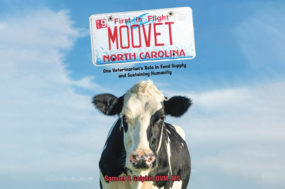Ag communications consultant and owner of CMA Consulting Charlie Arnot recently said this summer’s consumer and news media attention on food brands and agriculture production should be an “inflection point” in how agriculture perceives crisis management and the defense of traditional farming practices. Progressive Dairyman Editor Walt Cooley asked Arnot to explain his statement.
Q: What is different about how recent news about food and agriculture has played out than before?
ARNOT: A couple of things have shifted my thinking. The first was lean finely textured beef, or “pink slime.”
If you go back and look at the timeline of how that event evolved, it really caught fire after there was some media exposure. ( The Huffington Post has a great timeline on that, all the way back to when the company was founded, the initial memo that came out, Jamie Oliver, Food Inc . and then when it took off with the mommy blogger.)
For lack of a better descriptor, that thing had been smoldering for a while. But then all of a sudden, you get a mommy blogger in Houston who gets a hold of it and it just goes viral overnight.
Obviously ABC News, which did a piece, caused some additional interest, but that one to me, unlike a lot of other issues, really wasn’t the focus of an activist group or an organization dedicated to trying to change industry practices.
Without any kind of organized activist opposition, you saw a product that had been on the market for decades, was perfectly safe, had been accepted by the entire food system for an extended period of time, gone – just that quick.
And the speed at which those things happen causes us to have to rethink how we prepare and engage. The historical model of defending a position or industry practice is not going to work in a world that moves at the speed of Twitter.
If you’re not prepared when something happens or when something breaks, the likelihood of you being successful at managing that issue is significantly diminished.
The second one was what happened with the Kellogg’s brand Kashi . One store owner in Rhode Island, through some online research, discovered that some of the soy in the Kashi breakfast cereal on his shelves could have come from genetically modified soybeans.
So he took it off the shelf and put a sign up about the fact that he discovered it may not be as “natural” as promoted on the box. This is one store in Rhode Island. Basically, someone posted that online and it went viral. The backlash Kellogg’s took from that was just phenomenal.
Q: This all seems like bad news. But what about Domino’s standing up to pressure to ban gestation crates for the pork it buys? Isn’t that a win for producers?
ARNOT : There were very vocal supporters, but they came all from ag. If you were to talk to the people at Domino’s, my guess is they would tell you, “Look, don’t put us in the crosshairs.
We’re not gonna capitulate, but don’t put us on your billboard and claim us as a hero. We don’t want our brand to be the platform upon which this battle is fought.” There’s no upside for a pizza company to being the public platform for banning gestation stalls.
Their job is to sell pizzas, not to defend the way pigs are raised. Now they took a position that the pork industry was very supportive of, but it was about doing what they felt was best for Domino’s, not necessarily what they felt was best for producers.
Q: You’ve talked about a few crisis management situations, wildfires burning out of control – what about some of the recent campaign-driven challenges still facing producers?
ARNOT : You’ve got all the issues related to nutrition and obesity and soft drinks. New York Mayor Bloomberg’s announcement about a ban on soft drinks was one of those tipping points. It’s clearly something that is important to pay attention to for its potential. How could this now relate to what’s happening in agriculture and dairy products?
You’ve seen the same thing with flavored milk in schools, a very similar kind of process unfold. But I think you could really take any issue and look at the speed at which it moves, and it’s fundamentally different than ever before.
While before we’ve had to deal with campaigns, and we’ve had to deal with legislation, – now with the democratization of information, online communities and communication, it doesn’t take a highly organized, well-financed non-governmental organization (NGO) to get engaged and fundamentally change a production practice or a product formulation.
It can happen at the speed of Twitter just by a handful of very interested constituents deciding to make it their cause.
Of course, the speed at which everything is moving today isn’t new, but the way we’re seeing it impact the industry is new and different.
And what people seemed most upset about in both of the first two incidents was the lack of transparency. They felt like “industry” was trying to get one by them. What these incidents really tells us is transparency is no longer optional.
Q: What should ‘more transparency’ mean to dairy producers?
ARNOT: We all have to operate as though someone is watching everything we do, all the time. If we put our practices to that test, are we comfortable? Now, does that mean you have to achieve perfection? No, that’s not a realistic goal.
But what it does mean is that people expect a genuine commitment to doing what’s right, and I think, by and large, the dairy community and others in agriculture are committed to doing what’s right. But we don’t always talk about that.
The level of vitriol in the backlash when people felt as though they’d been deceived if you go to Kashi’s Facebook page and read some of the Facebook posts you’ll see it.
These were people who bought Kashi because of what it represented to them; it was “wholesome,” “good food,” “consistent with their values,” – all of a sudden they are left with an image that was dramatically inconsistent with that.
That’s not too different from the way people probably feel about farmers, in general. People like farmers, people feel that farmers are good, wholesome people committed to doing the right thing.
So when they’re presented with information that is inconsistent with that, it causes a much stronger emotional reaction. The issues haven’t fundamentally changed; the context has changed.
Q: If we’ve reached an inflection point, what are we now redirecting towards?
ARNOT: We’re redirecting toward a period of radical transparency, so I don’t think the question is any longer, “Will you be transparent?” I think the question is, “How are you going to manage these issues and your reputation in an age of radical transparency?”
Q: What issues related to dairy lie just under the surface that may require more of the transparency you’ve mentioned?
ARNOT: Tail docking as a practice is clearly there. It may have already blown up, depending on your perspective.
That one is pretty easy to see how it ends – you’ve seen it go away in some states. I think you’re going to continue to see significant pressure on animal health products. As the battleground shifts, you’re seeing those issues raised in a lot of places.
Those to me would be the primary ones. Anything perceived as a potential food safety risk has a much higher level of consumer concern.
Q: What is your general takeaway message to calling ag producers’ attention to these recent events?
ARNOT: Sometimes, particularly in remote areas or because farmers don’t have a lot of direct customer or consumer contact, we’ve operated under the assumption that no one will find out.
That’s a really high-risk proposition. We also need to recognize that each farmer has a vested interest in how every farmer operates.
So, if you have somebody who causes a situation where a product or process ends up being taken off the market, it doesn’t only impact an individual, it impacts everyone. Everybody in the dairy industry has a vested interest in making sure everybody operates in a socially responsible manner.
Q: So these are discussions that producers should be having among themselves?
ARNOT: Absolutely, where the rubber meets the road is on the farm. Historically in agriculture it’s been tradition that what happens on my farm is my business and what happens on your farm is your business.
But today what happens on your farm could impact my business. So how do we create shared interest and still respect the individual privacy that everybody enjoys in agriculture? That’s going to be an emerging challenge for us. PD
Arnot works with food producers and processors throughout the food system, including restaurants, associations, commodity companies and more. Click here to reach him.







